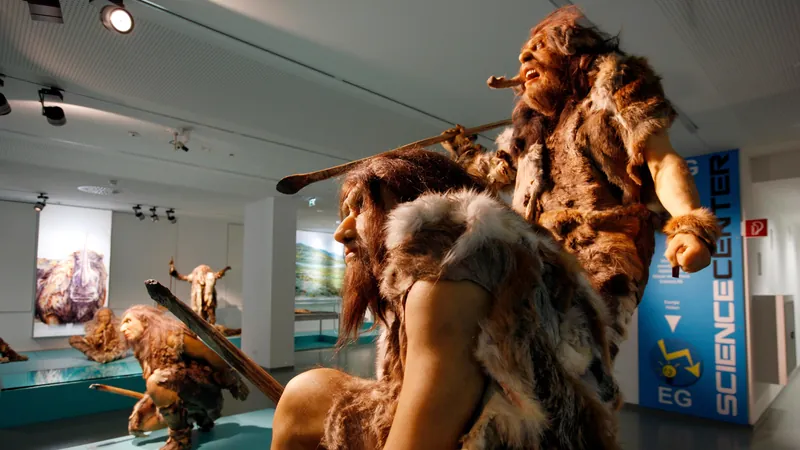
Ancient Neanderthal 'Fat Factory' Discovered: A 125,000-Year-Old Survival Secret Unveiled!
2025-07-02
Author: Sophie
Neanderthals' Ingenious Survival Strategy Unearthed
Imagine a bustling 'fat factory' created by Neanderthals 125,000 years ago in what is today Germany! A groundbreaking study published in the journal Science unveils that these ancient humans adeptly extracted grease from animal bones, a practice that may have been crucial for their survival.
Combatting Protein Poisoning
In a world where they primarily feasted on meat, Neanderthals faced a significant risk of protein poisoning, commonly referred to as 'rabbit starvation.' This dangerous condition arises when the body is overloaded with protein and deprived of fats and carbohydrates. The discovery of their 'fat factory' highlights how Neanderthals innovatively overcame this nutritional hurdle.
Resource Optimization Ahead of Its Time
This discovery pushes back the timeline for our understanding of resource optimization among early hominins. Previously, the earliest evidence of such practices was thought to have emerged 28,000 years ago—well after the extinction of Neanderthals. The research indicates that they were far more resourceful than we once believed.
What Was Found?
Archaeologists excavated an extensive site in Neumark-Nord, Germany, unearthing the remains of 172 large animals. Among them were horses, deer, and cattle, alongside tools crafted by Neanderthals. The evidence shows that these ancient humans smashed bones to access the nutrient-rich marrow before boiling them to render the fat.
A Creative Approach to Survival
"It’s surprisingly creative and innovative behavior from Neanderthals," remarked archaeologist Osbjorn Pearson from the University of New Mexico. This finding reveals just how advanced Neanderthal society was, particularly in their food preparation methods.
Understanding Neanderthals
Neanderthals, our closest extinct relatives, roamed the Earth approximately 400,000 years ago and vanished about 34,000 years ago. While previous research has shed light on their hunting techniques and meat consumption, this recent study provides an unprecedented glimpse into their post-hunt practices.
A Labor-Intensive Process
The vast number of bone fragments—totaling around 2,000—discovered at the archaeological site were meticulously crushed for grease extraction. This labor-intensive process involved breaking bones near their fat-storing areas, underscoring the importance of this practice in their diet.
Calories Matter —— A Vital Discovery
Given the challenging conditions Neanderthals often faced, including starvation, fat became an essential calorie source. Research indicates that fat delivers over twice the calories per gram compared to carbohydrates and proteins, significantly impacting their survival.
Hints of Storage and Human Similarities
This study also suggests that Neanderthals may have engaged in some form of food storage, aligning them more closely with historically documented foragers than previously thought. Archaeologist Wil Roebroeks emphasized the intriguing parallels between modern humans and Neanderthals, showcasing the evolutionary journey we share.
Implications for Understanding Human Evolution
Gaining insight into the dietary practices and acquisition methods of Neanderthals could enhance our understanding of human evolution. The additional calories from bone-derived fat might have played a critical role in extending lifespans and promoting reproductive success throughout early human history.
Conclusion: Bridging the Past with Today
As archaeology continues to reveal the sophisticated behaviors of Neanderthals, we gain not just knowledge of our ancient relatives, but insights that resonate with our own human story.









 Brasil (PT)
Brasil (PT)
 Canada (EN)
Canada (EN)
 Chile (ES)
Chile (ES)
 Česko (CS)
Česko (CS)
 대한민국 (KO)
대한민국 (KO)
 España (ES)
España (ES)
 France (FR)
France (FR)
 Hong Kong (EN)
Hong Kong (EN)
 Italia (IT)
Italia (IT)
 日本 (JA)
日本 (JA)
 Magyarország (HU)
Magyarország (HU)
 Norge (NO)
Norge (NO)
 Polska (PL)
Polska (PL)
 Schweiz (DE)
Schweiz (DE)
 Singapore (EN)
Singapore (EN)
 Sverige (SV)
Sverige (SV)
 Suomi (FI)
Suomi (FI)
 Türkiye (TR)
Türkiye (TR)
 الإمارات العربية المتحدة (AR)
الإمارات العربية المتحدة (AR)